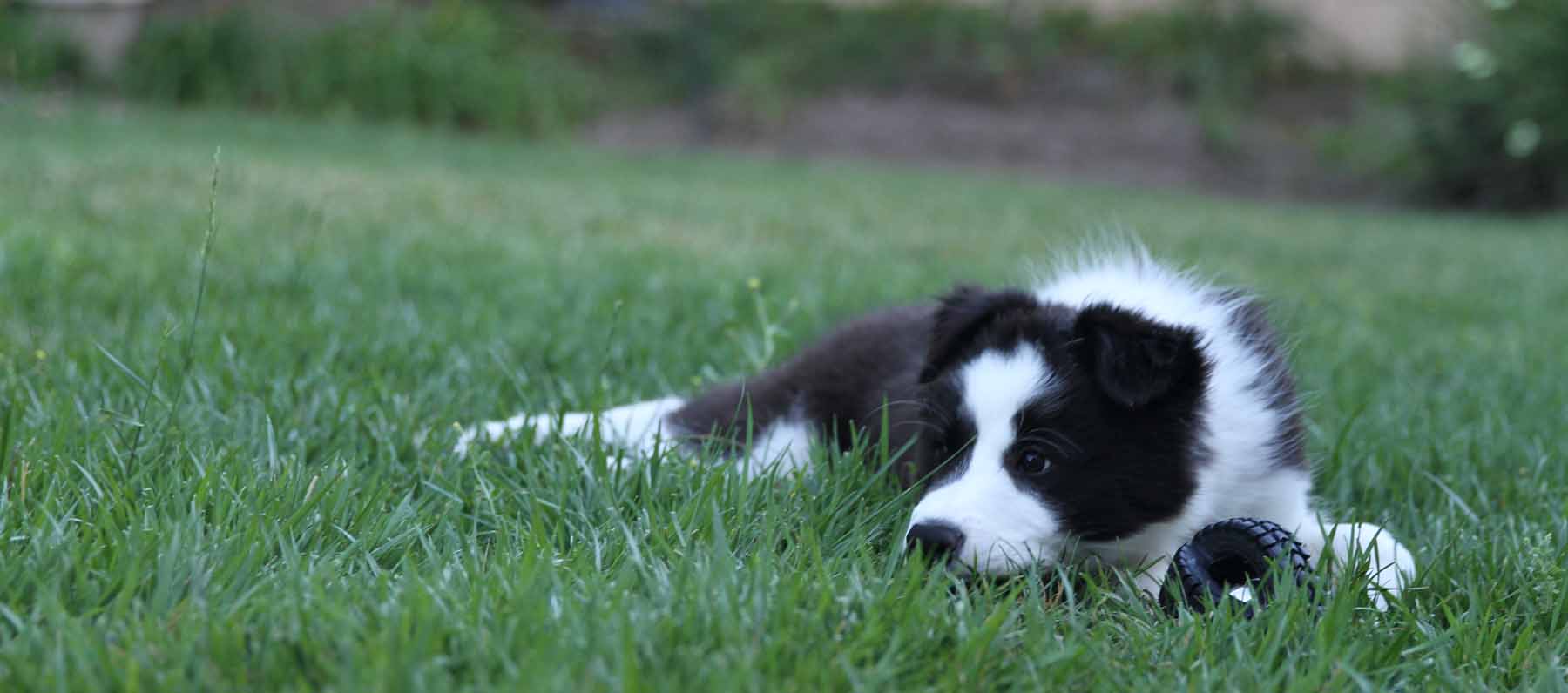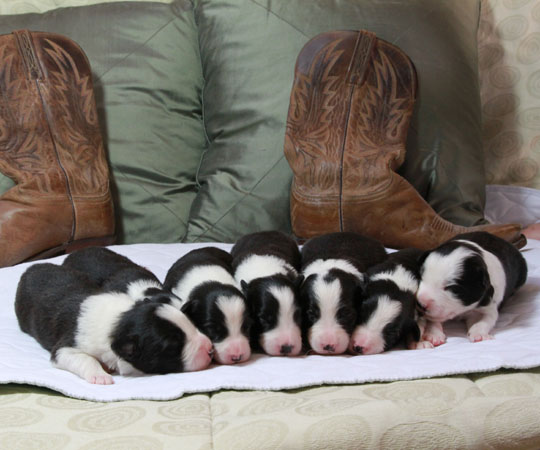Looking for a Border Collie Puppy?
 |
||
Are you looking to buy a Border Collie puppy to add to your family? There are many places you can get a puppy and the choices can be confusing. Here are some of the puppy sources that you will come across while looking for your new family member, and all are readily found here in California:
- Reputable Breeder
- Rescue Organization
- Puppy Mill
- Backyard Breeder
A reputable breeder such as ourselves will have put considerable money and effort into breeding healthy pups that will bring years of enjoyment to the families they go to, and will have taken every effort to minimize any health or temperament problems that may arise through careful selection of their breeding dogs and properly preparing the young pups for life with their new families. If the owner of such a puppy is no longer able to look after it at any point in its life, a reputable breeder will take back and rehome the puppy. All of the dogs that end up in rescues originate from puppy mills and backyard breeders, often due to health or temperament issues. Reputable breeders, unlike puppy mills and backyard breeders, do not end up making money from the sale of puppies (although you may have to pay slightly more to buy a puppy from a reputable breeder since their costs are significantly higher).
Distinguishing a reputable breeder from a puppy mill or backyard breeder can be a daunting job for the prospective puppy buyer. There are, however, a few clues that you, as a pet buyer, can use to spot the puppy mills and backyard breeders. Look for the following indicators of a reputable breeder:
-
Both the father (sire) and mother (dam) of the puppy will have proved themselves to be of breeding quality to expert AKC judges and acquired titles that form part of the parents' official AKC registered names. If this information is not provided by a breeder, ask for it.
-
The prefix initials at the start of the AKC registered name indicate that the dog has been awarded a championship title. The CH title is a conformation championship title that means at least 3 AKC judges (often many more) have evaluated the dog in competition and certified that the dog is structurally sound and representative of its breed, and is therefore suitable for breeding. There are more advanced levels of championship titles available - for example GCH (grandchampion) and higher levels such as bronze-level grandchampion (GCHB) where very many judges have judged the dog to be superior to many other Border Collies in competition for structure and breed-type. Note: during the COVID period, many AKC events were cancelled (particularly conformation dog shows) and there are many worthy younger dogs that did not have the opportunity to enter dog shows and earn the AKC CH title. Dog shows only opened back up in California in late 2022 to the point where entry numbers have been sufficient to enable dogs to finish their championships.
-
The suffix initials at the end of the AKC registered name indicate that the dog has earned performance titles. Such titles indicate that the breeder has spent time (often considerable) working with the dogs in various events, and the dogs have not just been used for breeding. A dog with many titles after its name is an indication that the dog is a loved member of the breeder's family.
-
For a full list of AKC titles, see: http://www.akc.org/events/titles
-
Be wary of a breeder that uses the term "champion blood lines". This translates to mean that the parents of their puppies are not champions themselves and have no performance titles, but their dogs can be traced back to champions in their pedigree. The breeder is likely a puppy mill that obtained dogs from a reputable breeder and is breeding for money without regard to improving the breed and, in many cases, without health clearances. Their dogs typically spend their lives in kennel runs with minimal human social contact, and they can be fearful and skittish with strangers. We do not sell dogs to puppy mills.
-
-
Examine the health clearances of the sire and dam. There are a number of health problems that affect Border Collies, some of them genetic and some of them structural. Genetic problems with the sire / dam will be passed on directly to the puppies they produce, and structural problems are highly likely to be passed on from one generation to the next. Here are some of the things to look for from a responsible breeder and, again, if the breeder does not provide the information, ask for it.
-
Genetic Clearances. A number of health problems in Border Collies are the result of genetic mutations, many of which can now be tested for through DNA testing. There are 3 common genetic mutations in particular that can now be tested for which can be devastating for affected pups - those for Collie Eye Anomaly (CEA/CH), Trapped Neutrophil Syndrome (TNS), and Ceroid Lipofuscinosis (CL). These are all recessive genetic traits controlled by single genetic mutations. As responsible breeders, we carry out extensive genetic testing on our dogs. None of our dogs carry the genes for these conditions, and they will not produce affected puppies. Occassionally a breeder may wish to use a stud that is a carrier for one of these conditions if the stud is otherwise an outstanding example of the breed and is used with a female that is clear for the genetic mutation. This is always done in conjunction with genetic testing and, fortunately, it is now possible to easily select against carriers for that condition in the pups produced (some of which will be genetic carriers, but none will be affected).
-
Structural Clearances. The most important structural clearance to look for in both sire and dam is for the hips, since hip dysplasia is very common in the breed. This results from an improper fitting of the hip joint causing lameness (usually manifesting itself later on in life). Bad hips in the parents usually results in bad hips in the offspring, and the required surgery to fix the condition typically costs in excess of $5000. The most commonly recognized clearance to obtain for breeding dogs is provided by the Orthopedic Foundation for Animals (OFA) in the USA. Breeders submit hip X-rays to OFA which are then examined by expert orthopedic radiologists and given a net grade (ideally "good" or "excellent"). For a Border Collie, a hip rating of fair, borderline, mild or below probably should not be bred. Always demand OFA hip scores of both parents from the breeder.
-
- Reputable breeders will encourage approved puppy buyers to visit and meet their dogs. There is no better indication of what the puppy will grow up to be like than meeting the parents! It also gives an opportunity to meet the breeders since a responsible breeder will offer lifetime follow-up support and guidance in raising the puppy. If the breeder does not encourage visiting them, there is a reason and it is probably not good (although they may give excuses to explain why you shouldn't visit). Puppy mills never allow prospective puppy buyers to visit.
We invest significant effort into our application process, and communicate extensively with our prospective puppy buyers once they have passed the initial application process. This starts with the online questionnaire we request that you complete.
We normally welcome puppy buyers on our waiting list to visit after the initial application stage, and this often forms part of our puppy socialization process.
 Puppies
Available
Puppies
Available